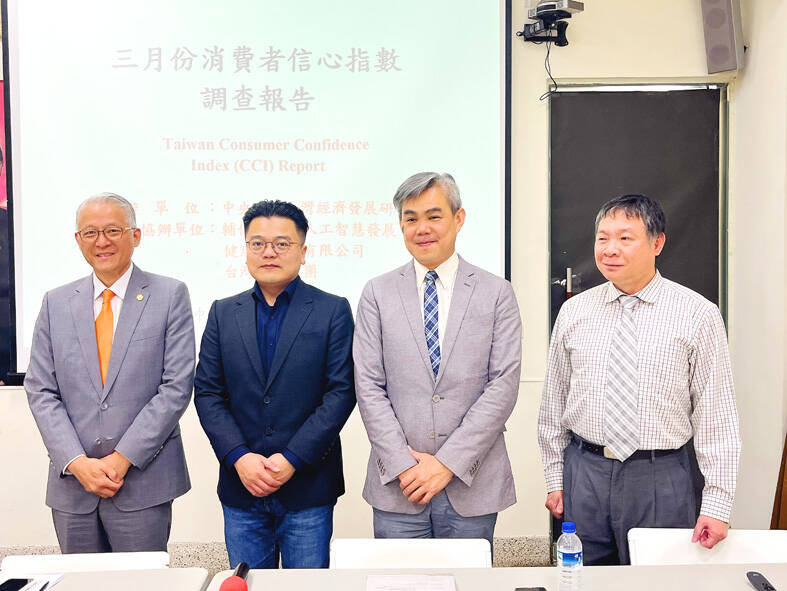Taiwan’s consumer confidence index fell 0.73 points to an 11-month low of 71.86 this month, as the government is set to raise electricity rates next month, fueling inflation concerns, a survey by the Taiwan Economic Development Research Center at National Central University (NCU) showed yesterday.
The subindex on consumer prices lost 1.2 points to 35.26, a new nine-month low, reflecting a general discontent among the public about consumer price trends.
NCU economics professor Dachrahn Wu (吳大任) said that retailers and restaurants would pass cost hikes on to consumers even though heavy electricity users would bear the brunt of fee adjustments.

Photo: Hsu Tzu-ling, Taipei Times
The subindex gauging people’s willingness to purchase durable goods fell by 0.8 points to 101.99, while expectations of household income over the next six months dropped 0.69 points to 81.94, the survey showed.
The subindex measuring people’s stock investment interest shrank 0.59 points to 49.89, the worst in 11 months, as the local bourse saw corrections, in line with global shares, it showed.
The home-buying interest reading softened by 0.72 points to 99.56, as prospective buyers prefer to wait and see on expectations of price falls, the survey showed.
Separately, the National Development Council (NDC) yesterday said its business climate monitor last month turned “yellow-red” for the second consecutive month, reflecting a sustained economic expansion, as local tech firms benefited from US technology giants’ investments in artificial intelligence (AI).
The monitor’s value gained 2 points to 37, just one point away from a “boom,” thanks to a pickup in manufacturing sales, and wholesale, retail and restaurant revenues, the NDC said.
The council uses a five-color system to depict the nation’s economic state, with “red” indicating a boom, “green” suggesting steady growth, “blue” signaling a recession, “yellow-red” showing that the economy is growing stronger and “yellow-blue” suggesting a weakening economy.
“Strong AI demand accounted for improving manufacturing sales and wholesale revenues, offsetting the decline in private consumption,” NDC Economic Department Director Chiu Chiu-ying (邱秋瑩) said.
However, the gauge on overtime hours shed 1 point, as domestic service providers reported a business slowdown after the end of the Lunar New Year holiday, Chiu said.
The index of leading indicators, which seeks to project the economic picture in the following six months, increased 0.64 percent to 103.35, rising for four consecutive months, as construction, semiconductor equipment imports and manufacturers’ business confidence showed positive cyclical movements, Chiu added.
The index of coincident indicators, which mirrors Taiwan’s economic conditions, increased 0.68 percent, the 22nd consecutive month of growth, to 105.27, affirming a steady growth in the economy, Chiu said.
The government has created a task force to monitor and respond to uncertainty linked to US President Donald Trump’s tariff policy, which could have a negative impact on global trade and on Taiwan’s exports, she said.

Taiwan will prioritize the development of silicon photonics by taking advantage of its strength in the semiconductor industry to build another shield to protect the local economy, National Development Council (NDC) Minister Paul Liu (劉鏡清) said yesterday. Speaking at a meeting of the legislature’s Economics Committee, Liu said Taiwan already has the artificial intelligence (AI) industry as a shield, after the semiconductor industry, to safeguard the country, and is looking at new unique fields to build more economic shields. While Taiwan will further strengthen its existing shields, over the longer term, the country is determined to focus on such potential segments as

UNCERTAINTY: Innolux activated a stringent supply chain management mechanism, as it did during the COVID-19 pandemic, to ensure optimal inventory levels for customers Flat-panel display makers AUO Corp (友達) and Innolux Corp (群創) yesterday said that about 12 to 20 percent of their display business is at risk of potential US tariffs and that they would relocate production or shipment destinations to mitigate the levies’ effects. US tariffs would have a direct impact of US$200 million on AUO’s revenue, company chairman Paul Peng (彭雙浪) told reporters on the sidelines of the Touch Taiwan trade show in Taipei yesterday. That would make up about 12 percent of the company’s overall revenue. To cope with the tariff uncertainty, AUO plans to allocate its production to manufacturing facilities in

COLLABORATION: Given Taiwan’s key position in global supply chains, the US firm is discussing strategies with local partners and clients to deal with global uncertainties Advanced Micro Devices Inc (AMD) yesterday said it is meeting with local ecosystem partners, including Taiwan Semiconductor Manufacturing Co (TSMC, 台積電), to discuss strategies, including long-term manufacturing, to navigate uncertainties such as US tariffs, as Taiwan occupies an important position in global supply chains. AMD chief executive officer Lisa Su (蘇姿丰) told reporters that Taiwan is an important part of the chip designer’s ecosystem and she is discussing with partners and customers in Taiwan to forge strong collaborations on different areas during this critical period. AMD has just become the first artificial-intelligence (AI) server chip customer of TSMC to utilize its advanced

Chizuko Kimura has become the first female sushi chef in the world to win a Michelin star, fulfilling a promise she made to her dying husband to continue his legacy. The 54-year-old Japanese chef regained the Michelin star her late husband, Shunei Kimura, won three years ago for their Sushi Shunei restaurant in Paris. For Shunei Kimura, the star was a dream come true. However, the joy was short-lived. He died from cancer just three months later in June 2022. He was 65. The following year, the restaurant in the heart of Montmartre lost its star rating. Chizuko Kimura insisted that the new star is still down